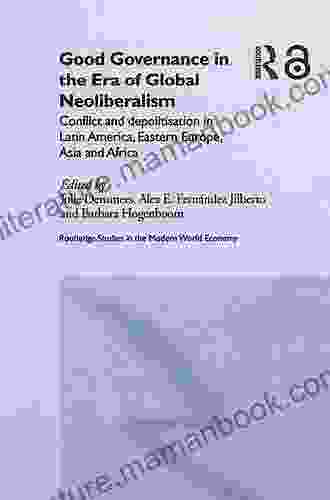Conflict and Depolitization in Latin America, Eastern Europe, Asia, and Africa: A Comprehensive Analysis

Conflict and depolitization are major challenges facing many regions of the world today. In Latin America, Eastern Europe, Asia, and Africa, these issues have been particularly pronounced, leading to political instability, social unrest, and economic inequality. This article will explore the causes and consequences of conflict and depolitization in these regions, and examine potential solutions.
There are a number of factors that can contribute to conflict, including:
- Economic inequality: When there is a large gap between the rich and the poor, it can create resentment and social unrest.
- Political instability: Weak or corrupt governments can be unable to provide security and justice, leading to conflict.
- Resource scarcity: Competition over resources such as water, land, and minerals can lead to conflict.
- Historical grievances: Past conflicts and injustices can create tension between different groups and lead to new conflicts.
- External intervention: Foreign powers can exploit existing conflicts or create new ones for their own strategic purposes.
Conflict can have a devastating impact on individuals, communities, and nations. Some of the consequences of conflict include:
4.6 out of 5
| Language | : | English |
| File size | : | 2415 KB |
| Text-to-Speech | : | Enabled |
| Screen Reader | : | Supported |
| Enhanced typesetting | : | Enabled |
| Word Wise | : | Enabled |
| Print length | : | 340 pages |
- Loss of life: Conflict can lead to the deaths of thousands or even millions of people.
- Displacement: Conflict can force people to flee their homes and become refugees or internally displaced persons.
- Economic damage: Conflict can destroy infrastructure, disrupt trade, and lead to economic collapse.
- Social unrest: Conflict can tear apart communities and create social divisions.
- Political instability: Conflict can lead to the collapse of governments and the rise of authoritarian regimes.
Depolitization refers to the decline in political participation and engagement. There are a number of factors that can contribute to depolitization, including:
- Lack of trust in government: When people lose faith in the ability of their government to represent their interests, they may become disillusioned and stop participating in the political process.
- Corruption: Corruption can undermine public trust in government and lead to depolitization.
- Apathy: People may become apathetic about politics if they feel that their voices do not matter or that they cannot make a difference.
- Repression: Authoritarian regimes may suppress political opposition and discourage political participation.
- Social fragmentation: Social divisions can make it difficult for people to come together and work towards common goals.
Depolitization can have a number of negative consequences, including:
- Reduced accountability: When people are not politically engaged, they are less likely to hold their government accountable for its actions.
- Weakened democracy: Depolitization can weaken democratic institutions and make it easier for authoritarian regimes to take power.
- Increased inequality: When people are not politically active, they may be less able to protect their interests and reduce inequality.
- Social unrest: Depolitization can lead to social unrest as people become frustrated with the lack of political representation.
- Violence: In some cases, depolitization can lead to violence as people resort to other means to express their grievances.
There are a number of potential solutions to the problems of conflict and depolitization. Some of these solutions include:
- Addressing economic inequality: Reducing the gap between the rich and the poor can help to reduce resentment and social unrest.
- Promoting good governance: Strong and accountable governments can help to provide security and justice, and reduce the risk of conflict.
- Managing resource scarcity: Fair and sustainable management of resources can help to prevent conflict.
- Addressing historical grievances: Confronting and resolving past conflicts can help to prevent new conflicts from emerging.
- Reducing external intervention: Foreign powers should avoid exploiting conflicts or creating new ones.
- Building trust in government: Governments can build trust by being transparent, accountable, and responsive to the needs of their citizens.
- Combating corruption: Corruption can be reduced through strong laws and enforcement, and by increasing transparency and accountability.
- Promoting political participation: Governments can encourage political participation by making it easier for people to vote, run for office, and participate in the political process.
- Addressing social fragmentation: Governments and civil society organizations can work to build bridges between different groups and promote social cohesion.
Conflict and depolitization are major challenges facing many regions of the world today. These issues can have a devastating impact on individuals, communities, and nations. However, there are a number of potential solutions to these problems. By addressing the underlying causes of conflict and depolitization, we can help to create a more peaceful and just world.
4.6 out of 5
| Language | : | English |
| File size | : | 2415 KB |
| Text-to-Speech | : | Enabled |
| Screen Reader | : | Supported |
| Enhanced typesetting | : | Enabled |
| Word Wise | : | Enabled |
| Print length | : | 340 pages |
Do you want to contribute by writing guest posts on this blog?
Please contact us and send us a resume of previous articles that you have written.
 Top Book
Top Book Novel
Novel Fiction
Fiction Nonfiction
Nonfiction Literature
Literature Paperback
Paperback Hardcover
Hardcover E-book
E-book Audiobook
Audiobook Bestseller
Bestseller Classic
Classic Mystery
Mystery Thriller
Thriller Romance
Romance Fantasy
Fantasy Science Fiction
Science Fiction Biography
Biography Memoir
Memoir Autobiography
Autobiography Poetry
Poetry Drama
Drama Historical Fiction
Historical Fiction Self-help
Self-help Young Adult
Young Adult Childrens Books
Childrens Books Graphic Novel
Graphic Novel Anthology
Anthology Series
Series Encyclopedia
Encyclopedia Reference
Reference Guidebook
Guidebook Textbook
Textbook Workbook
Workbook Journal
Journal Diary
Diary Manuscript
Manuscript Folio
Folio Pulp Fiction
Pulp Fiction Short Stories
Short Stories Fairy Tales
Fairy Tales Fables
Fables Mythology
Mythology Philosophy
Philosophy Religion
Religion Spirituality
Spirituality Essays
Essays Critique
Critique Commentary
Commentary Glossary
Glossary Bibliography
Bibliography Index
Index Table of Contents
Table of Contents Preface
Preface Introduction
Introduction Foreword
Foreword Afterword
Afterword Appendices
Appendices Annotations
Annotations Footnotes
Footnotes Epilogue
Epilogue Prologue
Prologue Lee Broda
Lee Broda Franke James
Franke James Bill Bryson
Bill Bryson Natalie Parker
Natalie Parker Luni5 Apresenta
Luni5 Apresenta Justina Ireland
Justina Ireland Maxine Snowden
Maxine Snowden Roberto Belli
Roberto Belli Mike Dixon
Mike Dixon Bryan Zimmermann
Bryan Zimmermann R A Bowen
R A Bowen Kyle Walters
Kyle Walters David Thibodeau
David Thibodeau Laura Greenstein
Laura Greenstein One Of One Publisher
One Of One Publisher Michael Pettis
Michael Pettis Jo North
Jo North Martha Mier
Martha Mier Karen Kingsbury
Karen Kingsbury Michael E Kraft
Michael E Kraft
Light bulbAdvertise smarter! Our strategic ad space ensures maximum exposure. Reserve your spot today!
 Mario SimmonsFollow ·13.8k
Mario SimmonsFollow ·13.8k Chandler WardFollow ·15.1k
Chandler WardFollow ·15.1k Charles BukowskiFollow ·14k
Charles BukowskiFollow ·14k Jack ButlerFollow ·12.9k
Jack ButlerFollow ·12.9k Jorge Luis BorgesFollow ·8.9k
Jorge Luis BorgesFollow ·8.9k Eric HayesFollow ·9.4k
Eric HayesFollow ·9.4k Dawson ReedFollow ·6.7k
Dawson ReedFollow ·6.7k Brandon CoxFollow ·7.5k
Brandon CoxFollow ·7.5k

 Melvin Blair
Melvin BlairJames Wade's Captivating Tale: Delving into the Second...
In the heart of a realm where the veil...

 Eric Hayes
Eric HayesFabric Paper Thread: 26 Projects to Stitch with Friends
Get ready to embark on a captivating journey...

 Greg Foster
Greg FosterThe Grammy Awards Record of the Year 1958-2024: A...
The Grammy Awards, the most prestigious...

 Alex Foster
Alex FosterSaragarhi: The Forgotten Battle of the British Empire
On September 12,...
4.6 out of 5
| Language | : | English |
| File size | : | 2415 KB |
| Text-to-Speech | : | Enabled |
| Screen Reader | : | Supported |
| Enhanced typesetting | : | Enabled |
| Word Wise | : | Enabled |
| Print length | : | 340 pages |
















